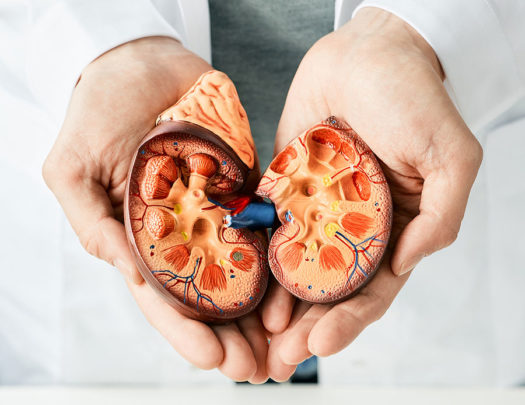Nephrology is a branch of Internal Medicine focusing on the kidney and its associated diseases. Nephrologists are physicians that trained in Internal Medicine and then pursued an additional two to three years of training solely on kidney disease. Our nephrologists most commonly treat patients with:
- Chronic Kidney Disease (CKD)
- Hypertension (High Blood Pressure)
- Kidney Stones
- Electrolyte Imbalances
In addition, the nephrologists at Idaho Nephrology offer expert care for patients requiring dialysis and kidney transplantation.
Chronic Kidney Disease (CKD)
Chronic Kidney Disease (CKD) is a condition where the body suffers from weak kidneys. Your kidneys clean and purify the blood by removing waste products and extra fluid. When the kidneys are weak, waste and toxins remain in the blood and cause disease. In the most extreme form of CKD, patients requires dialysis or a kidney transplant. Most patients have milder disease that can be treated with medications and diet. Risk factors for CKD include:
- Diabetes
- High blood pressure
- Heart disease
- Family history of kidney disease


Chronic Kidney Disease (CKD)
Chronic Kidney Disease (CKD) is a condition where the body suffers from weak kidneys. Your kidneys clean and purify the blood by removing waste products and extra fluid. When the kidneys are weak, waste and toxins remain in the blood and cause disease. In the most extreme form of CKD, patients requires dialysis or a kidney transplant. Most patients have milder disease that can be treated with medications and diet. Risk factors for CKD include:
- Diabetes
- High blood pressure
- Heart disease
- Family history of kidney disease
All patients with risk factors for chronic kidney disease should be tested for CKD. Testing for CKD can be done with a routine blood test.
Kidney Stones
Kidney stones are made of salts and minerals in the urine that stick together to form small “pebbles.” They can be as small as grains of sand or as large as golf balls. Kidney stones form when the normal balance of water, salts, minerals, and other things found in urine changes. This can happen if you do not get enough fluids (dehydration) or if you eat foods high in oxalate, such as dark green vegetables.
Electrolyte Imbalances
The kidneys are the master chemists of the body and when patients develop chemical imbalances, it is often the kidneys at fault. Our nephrologists are well equipped to evaluate and treat these conditions. Some common electrolyte abnormalities include:
- Low sodium: hyponatremia
- High sodium: hypernatremia
- Low potassium: hypokalemia
- High potassium: hyperkalemia
